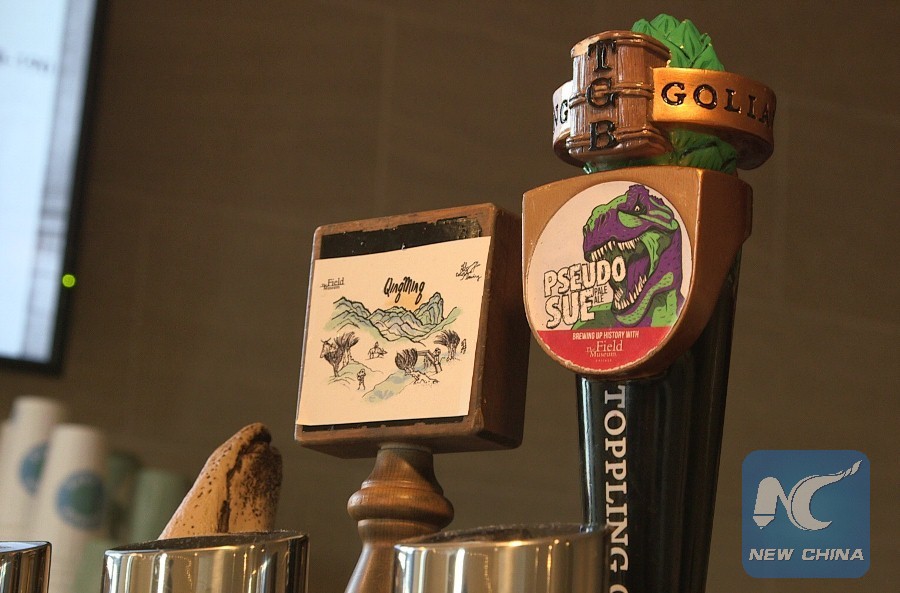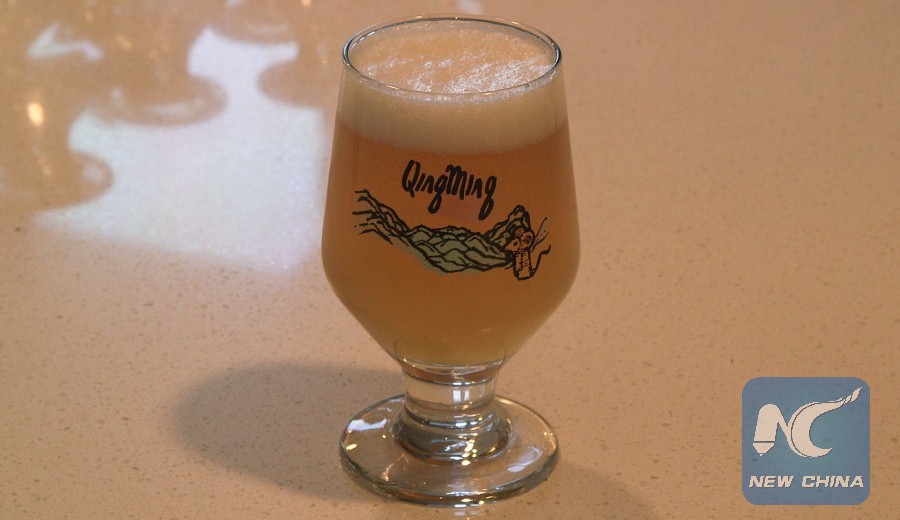
Photo taken on July 13, 2017 shows that the Field Museum of Natural History's New QingMing beer tap is installed beside other special brews in the dining hall of the museum in Chicago, the United States. (Xinhua Photo)
CHICAGO, July 14 (Xinhua) -- Chicago's Field Museum of Natural History teamed up with Off Color Brewing to create a new beer inspired by artifacts discovered during archaeological digs in Taixi and a Changzikou tomb dating back to the Late Shang/Western Zhou Dynasties.
The new beer was unveiled Thursday night at an official launch party at the museum.
The beer was named QingMing after the Chinese festival in April and the famous 12th Century scroll by Zhang Zeduan. The Field Museum displays a 17th Century reproduction of the scroll in its Cyrus Tang Hall of China along with many other Chinese artifacts. Among the artifacts on display at the launch party includes a 18th Century bronze "pitch pot" from Beijing, a popular drinking game.

Photo taken on July 13, 2017 shows a glass of QingMing beer at the Field Museum of Natural History in Chicago, the United States. (Xinhua Photo)
Gary M. Feinman, MacArthur Curator of East Asian Anthropology at the Field Museum, gathered literature on early Chinese alcohol production for John Laffler at Off Color Brewing. Laffler was inspired by the fruits incorporated in making certain Chinese alcohols as well as the mold saccharification of rice.
"I've always been interested in mold-based saccharification," Laffler told Xinhua. "It's really fun for us as brewers coming from Western traditions where we use grain-based enzymatic degradation of starch and simple sugars."
Crossing cultures and centuries to recreate flavors from ancient Chinese alcohols was a challenge for Off Color Brewing. While sourcing ingredients Laffler found that the U.S. Food and Drug Administration deemed some of the ingredients and flavorings necessary for brewing the alcohols are not currently legal.The end result of the Off Color brewing process is a modern recreation of Chang and a stronger, drier herbal version of Li, a low alcohol rice or millet-based beer with a flavor profile of peaches and lemon rind with aromas of tea, bubblegum, and sake followed by a complex fruit, herbal, and floral character. The finish, as the alcohol evaporates off the tongue, leaves hints of nectar, honey, and perfumed rice.
Feinman presented the historical significance of alcohol in China at the QingMing Beer launch, revealing that analysis of archaeological evidence from various excavations shows alcohol has been consumed in China for at least 5,000 years.
"Alcohol is not only an important part of early rituals in China, it actually is very important to almost any cultural region you want to look at," Feinman told Xinhua. In his presentation, Feinman explained the connection to alcohol as something that breaks down inhibitions and helps to solidify the links and ties between people if used in the proper context that goes along with building communities.
"I think it's neat that here at the Field Museum we have this event that brings in the community to see the historical significance of alcohol, get together and in a sense use alcohol the way it' s always served humankind," said Feinman.
The QingMing Beer launch party drew nearly a hundred history and beer enthusiasts from all over the country. Michael, a resident of Washington D.C. was visiting the Field Museum when he saw the event.
"I've been to the Field Museum many times," Michael told Xinhua. "I saw this event was today and I enjoy good beer, especially craft and specialty type beers, so it was a great opportunity to try something new."
QingMing Beer will be distributed to thirty-nine states in limited numbers starting Monday, July 17, but is already available at the Field Museum and Off Color Brewing's online Bottle Shop. The Field Museum plans to continue teaming up with Off Color to create unique beers that can accompany their exhibitions.

